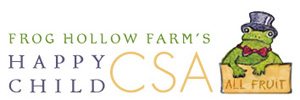Flavor Treat Pluot
One of our last stone-fruits of the season, the Flavor Treats are reddish-purple over tender, yellow flesh that’s extremely juicy. These pluots can be enjoyed for a few days if left on the counter. Don’t stack them though! If you’d like to enjoy them beyond 3-4 days you may want to set a few aside in the fridge.
Seckle Pears
A varietal that pre-dates the Bosc, the Seckel is much smaller in size and finds its origins near Philadelphia in the early 1800s. Also known as sugar pears, the Seckel is green with a dark-red blush or in some cases nearly all red. It’s extremely sweet with almost no acid and its fine flesh is very juicy. They are ripe when wrinkled and yielding slightly near the stem. Pears will store well in the fridge once they’ve reached your optimal ripeness.
Warren Pears
Our signature pear. The Warren is very soft and juicy with a silky sweetness that avoids the typical grittiness found in most pears. Ripe when wrinkled and yielding slightly near the stem. Pears store well in the fridge once they’ve reached your optimal ripeness.
Hosui Asian Pears
The Hosui is popular in both Japan and in California. They have a rougher, thicker skin than other Asian pears with flesh that while still crunchy has a more melting mouthful, making the texture combination when eaten out of hand spectacular. Very juicy and sweet with a milder pear taste, their round shape and beautiful golden hue make them ideal for presentation with a distinctively Autumnal feel. These pears do fine on the counter for up to a week. To enjoy after a week, store in the fridge.
Flame Seedless Grapes
Firm, large, and sweet the Flame Seedless are one of the most popular varieties in North America. Enjoy these out of hand or try them in green salads, chicken salads, or fruit salads. Grapes can be enjoyed from the counter within a few days of receiving your box or refrigerated to enjoy them further into the week.
A Note from Farmer Al
Dear CSA Members,
People often ask me this question “Isn’t farming organically a lot harder?” I think they must mean “harder” than farming conventionally, with chemicals, or maybe they assume, like most of us do nowadays, that the established guidelines (written by the “ESTABLISHMENT”….big business, big universities, and big government, know best and have all our “best” interests foremost in their thinking) are well proven, pre- dictable, and must be great since everyone is doing them.
I recall vividly other conventional farmers dismissively remarking that organic farming was “snake oil”. Remember that saying, “snake oil”? It originally referred to fraudu- lent health products or unproven medicine and has come to mean any product with questionable or unverifiable quality or benefit. We are always suspicious of anything we don’t understand. But we are also all too trusting of what “experts” tell us, with their backing of big universities, etc.
What I do know is this….after farming organically for 24 years, I know it works, and works well. I realize that the real “snake oil” in this story is the whole chemical farming system, created incredibly well “packaged” and sold to us by the likes of Ciba Geigy, Monsanto, Shell Oil, and all the other big oil companies, with the help of all the big universities, like UC Berkeley (my Alma Mater alas!).
Working with nature is what organic farming is all about. And yes, the wholeness of nature is still much of a mystery, but we can be thankful that scientists around the world are realizing that the chemical farming hoax is destroying our soils and is in fact destroying our whole ecosystem. The biological sciences are leading the way to unrav- eling the molecular biological interweaving of fungus, bacteria, and other microbes.
Here at Frog Hollow Farm we are all very excited, as you know, with our compost program. The goal is to work with nature using local and sustainable materials, mostly grown by us, to build the soil. That is our most important and most essential resource.


 Follow
Follow
